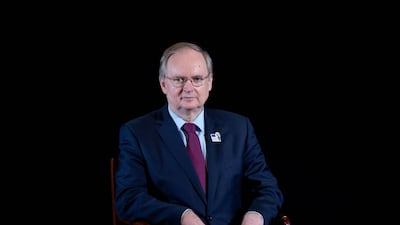Just over one week after the rebel take over Damascus and the fall of the Assad regime, states and institutions are jostling to send special envoys to the Syrian capital.
The key task is to open diplomatic channels with the new interim government led by Hayat Tahrir Al Sham. This has sparked renewed interest in Brussels in appointing a special envoy to Syria.
The EU settled on Austrian national Christian Berger, who has worked for more than two decades at the European Commission as a senior Middle East expert. Mr Berger has been described as a seasoned diplomat with strong contacts in the region.
"He knows how to work with different actors in the region," said Hussein Baoumi, foreign policy advocacy officer at Amnesty International's European institutions office in Brussels. "He has worked with all the key players in Syria, in Israel and Turkey. Overall, he has good contacts with key players."
Head of EU mission in Egypt, Turkey and Jerusalem
Mr Berger was until recently EU ambassador to Egypt after a four-year mandate in the same role in Turkey. He previously led the Middle East and North Africa department at the European External Action Service, the EU's foreign affairs arm, in Brussels.
Between 2009 and 2011, Mr Berger led the EU mission in Jerusalem. His CV shows no direct experience in Syria, although he worked on the EU Commission's Syria desk for one year in 1999 and served as operations officer in the UN peacekeeping mission to the Golan heights in 1987.
Mr Berger was listed with the title "upcoming EU ambassador for Syria, European Union" as a participant to the Doha forum this month. On the EEAS website, he is listed as "principal adviser" to the service of the deputy secretary of general affairs.
His name was first reported by Italian newspaper Il Foglio on November 1, a few days after the EU Commission confirmed it was working on nominating a special envoy to Syria. This choice has yet to be officially confirmed.
Yet with the recent takeover of Damascus by rebel groups led by Hayat Tahrir Al Sham, it remains unclear whether the nomination of a special envoy is still imminent. It will ultimately be decided by the EEAS's boss, Kaja Kallas, who took office on December 1 and was not involved in earlier discussions.

A major push over the summer saw eight EU countries nominate a diplomat to serve as focal point for the bloc's 27 member states in the region. Behind closed doors, some diplomats have said that it may have become unnecessary because the bloc has a charge d'affaires to Syria based in Beirut, Michael Ohnmacht, who regularly visits Damascus. He was sent to the Syrian capital on Monday by Ms Kallas to meet the rebels. EU countries are also in the process of sending their own representatives to Syria.
The bloc had cut ties with the Assad regime in May 2011 after human rights abuses against peaceful demonstrators. There are hopes that the ensuing civil war has come to an end with Mr Al Assad's departure.
Some EU countries are still pushing for a special envoy to Syria, although their mandate would have to be re-evaluated because of the HTS takeover. "It is something that is on the table," an EU official told reporters, speaking before a meeting of foreign affairs ministers in Brussels on Monday.
The initial call to review relations with Syria had been led by Italy and Austria earlier this year and was widely viewed as an attempt to encourage refugees to return due to pressure from far-right politicians. But the EU official denied such reports. Discussions were "technical", they said, and included sanctions against Syria and how to support Syrians with early recovery in basic infrastructure such as water and electricity.





















